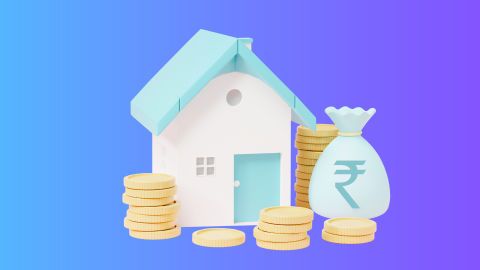A home loan down payment is the portion of money you contribute from your own pocket when purchasing a house. This amount is paid in advance and helps reduce the total loan you need to borrow from a financial institution. By putting down a reasonable amount, you show lenders that you are financially committed and able to take responsibility for repayments. This helps build trust and may lead to more favourable conditions, such as lower interest charges or flexible repayment terms. In many cases, a higher down payment can help you save more in the long run, as it reduces overall borrowing costs.
What is the down payment on a home loan?
A home loan down payment is the initial amount a homebuyer pays upfront towards the property, while the remaining balance is financed through a loan. It is typically calculated as a percentage of the property price. Although many buyers aim for a 20% contribution, the actual requirement may vary depending on the type of loan, lender’s policy, and eligibility criteria. Paying a down payment reduces your borrowing and signals financial responsibility to the lender.
Planning your home purchase requires careful consideration of both your down payment capacity and loan eligibility. Bajaj Finserv offers competitive rates starting from 7.15%* p.a. with loans up to Rs. 15 Crore* to help make your dream home affordable. Check your eligibility today. You may already be eligible, find out by entering your mobile number and OTP.
How much down payment for a home loan should be done
Down payment for home loan is 20% of the property value. According to the RBI rules, lenders in India can only provide 80% of the property value as a home loan for loans above Rs. 30 lakh.
For example, if you want to buy a house of Rs. 40 lakh, then you need to pay minimum 20% of it, that is Rs. 8 lakh.
How the down payment works
A home loan usually involves paying a certain amount in advance, and the remainder is funded by a bank or housing finance company. The size of your down payment affects how much you borrow, your monthly instalments, and the cost of borrowing over time.
1. Determine property value and loan amount
The home’s price is the property value. The lender assesses this value and then decides the maximum amount they can approve based on their lending rules and your eligibility.
2. Calculate the down payment
The down payment is the portion of the property price you must pay from your savings.
Example: If a property costs Rs.40 lakh and the lender finances 80% of it, you will need to contribute 20%, which equals Rs.8 lakh.
3. Lender's guidelines
Banks are governed by loan-to-value regulations, which determine how much of the property’s value can be financed. These rules are set so that lenders do not take excessive risk.
4. Increased down payment benefits
Lower interest rates: Paying more upfront reduces risk for lenders and may help you secure better interest rates.
Lower EMIs: A smaller loan amount results in reduced monthly repayments, making borrowing more manageable.
Faster approval: A healthy upfront payment reflects strong financial behaviour, which can help speed up the approval process and boost your creditworthiness.
A thoughtful down payment strategy can therefore positively influence your loan experience, affordability, and long-term financial comfort.
How to calculate a home loan down payment
Understanding how to work out your home loan down payment helps you prepare financially before applying for a loan. Start by knowing the total cost of the property and then check the loan-to-value (LTV) ratio that the bank is likely to offer. The remaining cost is what you will be required to pay upfront.
Calculation formula
The general method to compute your down payment is straightforward:
Down payment = Total property cost – Sanctioned home loan amount
Example calculation
Here is an illustration using a property priced at Rs.50,00,000:
Identify the LTV ratio: Banks can fund up to a certain percentage of the property value. For a house priced over Rs.30 lakh and up to Rs.75 lakh, lenders usually finance up to 80% of the cost.
Calculate the loan amount: Multiply the property cost with the LTV ratio.
Rs.50,00,000 x 80% = Rs.40,00,000 (Loan sanctioned)
Calculate the down payment: Subtract the approved loan from the property price.
Rs.50,00,000 – Rs.40,00,000 = Rs.10,00,000 (Down payment)
Add other upfront costs: Besides the down payment, you may need to pay various charges such as processing fees, stamp duty, and legal costs.
For instance, if the bank applies a 1% processing fee: Rs.40,00,000 x 1% = Rs.40,000
Total upfront payment = Rs.10,00,000 + Rs.40,000 = Rs.10,40,000
Planning for these additional expenses is essential to avoid shortfalls and ensure smooth loan processing.








